One of the biggest traps I think piano teachers who are new to teaching preschoolers fall into is expecting too much of them…or too little. One or the other.
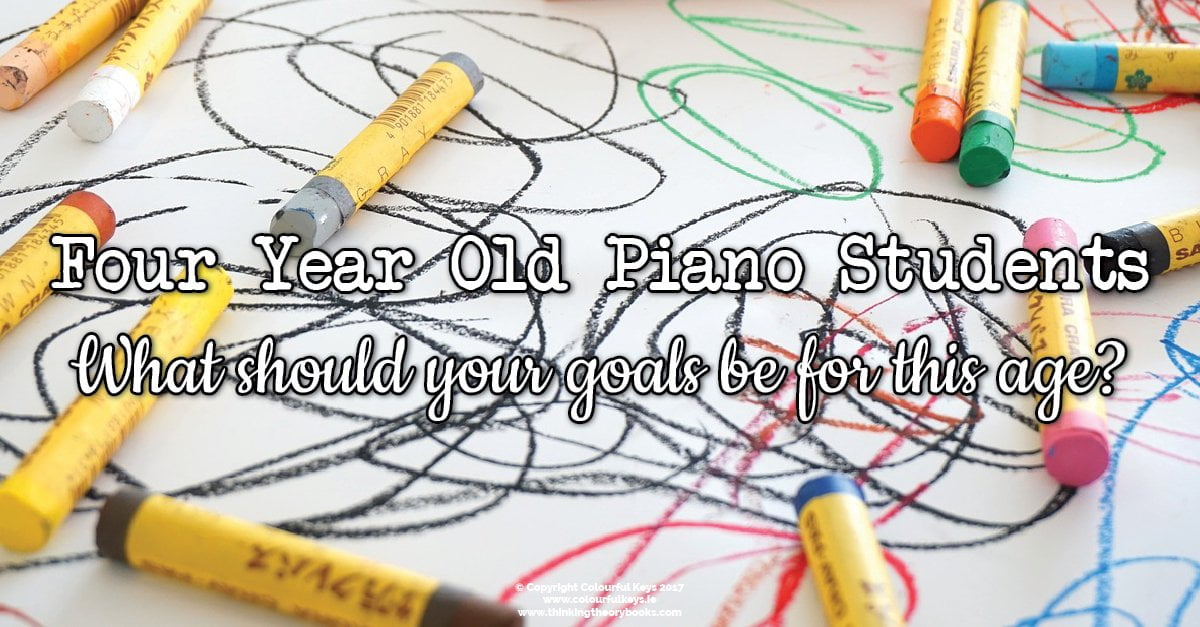
I fell into the too much camp. Not because I had lofty goals for my students, but mostly because I was worried what the parents would think. I was so used to teaching 8 year olds where they would be playing something parents would recognise after the first lesson – let alone the first month.
And I have had the odd 4 year old piano student who can do that. Some preschoolers are very quick for their age and leave playing a great little piece of music. But that’s not the norm.
When you adjust your expectations (and the parents’ if needs be) you’re setting yourself and the child up for success. Most of the first month of piano lessons with a 4 year old should revolve around creating a relationship and navigating the piano lesson.
So I now consider the first full month to be a foundation. I’m laying the groundwork for our lessons together, keyboard navigation and aural skills. These are my top four foundational skills that I focus on in that first month with a 4 year old piano student.
Rhythm Vocabulary
I use resources like my rhythm vocab cards and relative rhythm cards a lot in my preschool piano lessons.
I think that one of the biggest benefits of starting music so young is the rhythm language that kids learn. How many older students do you have that struggle with rhythm? My student who started as preschoolers just “get it”. What a wonderful asset for them to have later on.
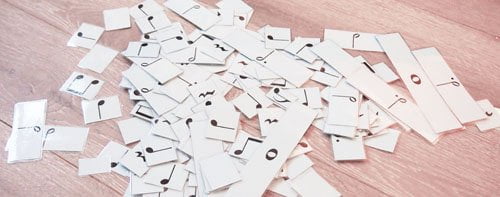
By the end of this first month most of my 4 year old piano students would be able to identify and chant quavers, crotchets and minims in the Kodály rhythm language. If they have difficulty with motor coordination they will just be chanting at this stage (TA TI TI TA-2 etc.) but if they’re up for it they might be accompanying this with actions such as claps, stamps and lap-claps.
Groups of Black Keys
For some 4 year olds, this really is all the keyboard navigation they can handle in that first month. I would be completely happy if they can play the big and small groups of black keys without the aid of manipulatives (such as my dog and gate cards).
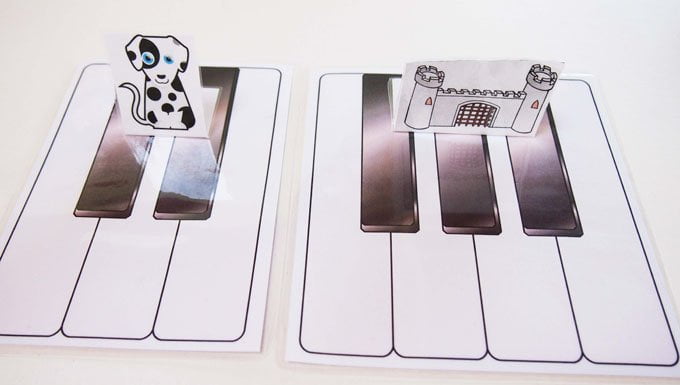
Of course, if they’re ready we’ll go on to start finding and naming white keys too. I’m not going to hold them back! Just remember, in this first month, your four year old student is still getting used to you, your studio space and the structure of lessons. That’s a lot for a preschooler in and of itself.
If you want more information on how I teach preschoolers to navigate the keyboard, watch out this live video I recorded with 4 fun keyboard geography activities.
Finger Isolation
There’s probably a technical term for this that I don’t know for this…
What I mean is, I want them to be able to waggle one particular finger when asked. Most 4 year olds will only be able to do this with finger two when they first come to me. At the end of the first month I want them to be able to at least move their finger two, three and one at will.
A big part of how we do this is the Wunderkeys finger plays. In Wunderkeys the finger friends have little poems with actions that help with finger dexterity and coordination. These rhymes are super cute and the kids absolutely adore them. Which makes my job easier for sure. 🙂
Imitation
Huh? You thought I was all about creativity and freedom! Why would I want a 4 year old to learn to imitate first and foremost?!
Well, this is one of the piano lesson readiness factors for me. If a student simply does not want to imitate the sound I’m making – like they have NO interest in making the same sound as I am – they might not be ready for piano lessons just yet.
Every student under age six starts with a 4 week trial. Now, there’s actually not much that will lead me to say they’re not ready. I know some teachers want the child to be able to sit, listen, or stay on the bench for at least five minutes, and I get that. But for me and the way I teach these kiddos, none of those things are an issue.
What is an issue is if they don’t want to make music. I’m all for improvisation, but some 4 year olds only want to bash the keys. They’re not interested in making the same sounds I did – even when they’re capable of doing so.
Not wanting to imitate sounds after that first month (vocally or at the piano) is a sign they should wait six months or so and try again. They’re just not ready.
What would go in your top four goals?
Do you think my goals are about right for that first month? What would you add?
Tell me about it (even if you think I’m way off!) over in the Vibrant Music Studio Teachers community on Facebook. Look forward to chatting with you there.
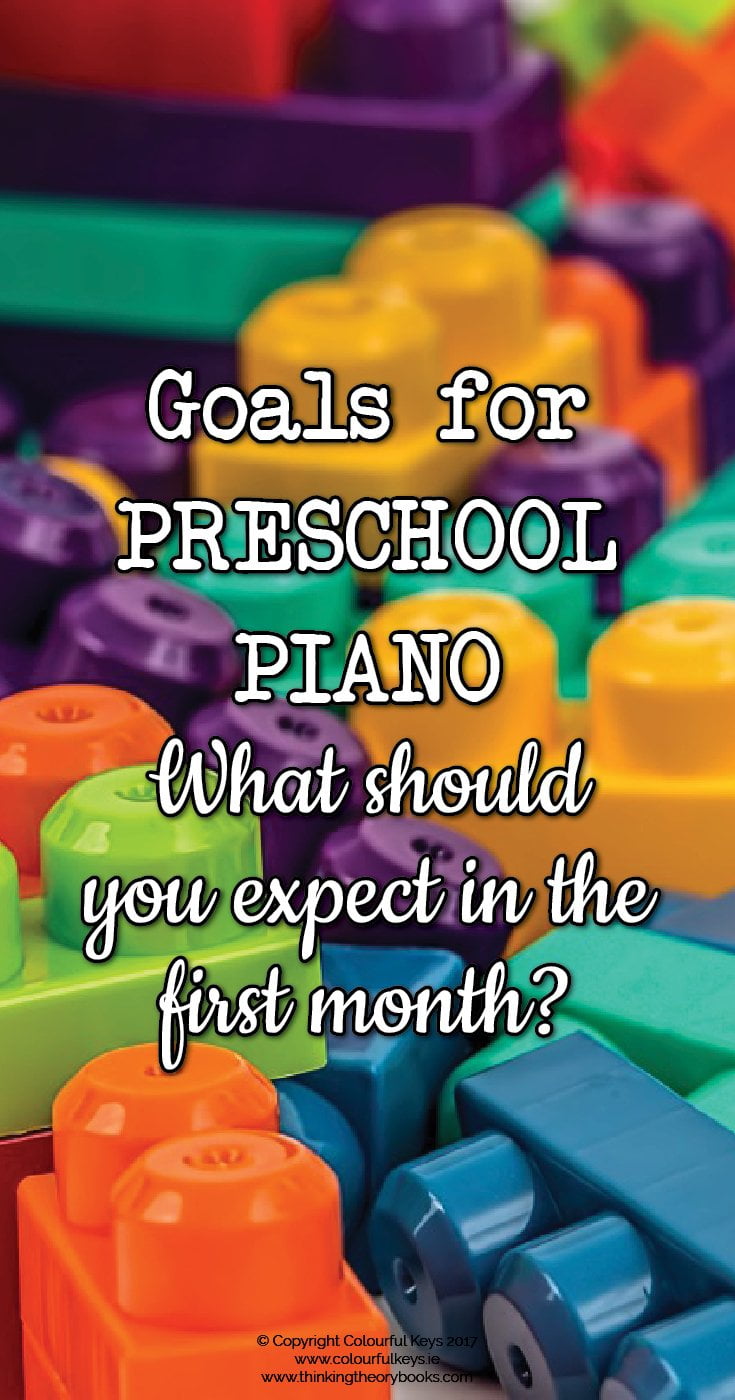
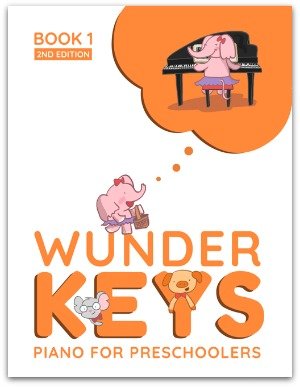
I Had a preschooler this year. The mother thought he had an artist coming… but she was wrong. He likes to play with his little piano, and that’s what he’s going to keep on doing. He can be creative, but that didn’t show up in the 1 month class we had together. I tried everything, even the little spider on his fingers… but he would just keep playing with an up straight-like-a-board hand. He couldn’t play one single note at a time, he did learn to distinguish the sets of black keys and locate the C note with some hints, and loved to play by colours, but didn’t quite understand much either. He also started to understand low and high notes, and followed some drawing grafics… but that was it.
I also settled some objectives (i’m used to preschoolers on other contexts) that looked realistic and without wish he couldn’t progress:
– use a spider like hand, and play with each (one) finger at a time
– distinguish sets of black keys
– understand going up and going down on the piano keys
– follow simple grafics of height and colour
I couldn’t get him to do the most important – the 1st one…
So i called of the classes and told the mother to keep him on the playing register, free to create, at home.
Do you think i should of insisted more?
Hi Dulce, thanks for your thoughts. Honestly? I would never expect a preschooler to play with a curved hand position and use each finger independently after just one month. For the first while we would be using only one finger at a time and then gradually moving on to others. Most 4/5 year olds are barely learning their pencil grip, so they need very gradual steps up to moving fingers one by one.
If you want to look into this more, I suggest reading the Piano Safari mini-essays about why they start with finger 2. Interesting and very practical stuff.
This is such a timely post, thank you. I just had a preschooler who was the first one I have had to say “not ready yet” to. I found that very difficult as I have always tried my best to be accessible to all students. She turned 3 recently so I was realistic about what she could achieve. I have taught another student this young who “got it” right away so I was hopeful and willing to conduct the four free trial lessons. Today was the fourth lesson and she managed to get through all 7 of my 3-5 minute activities. But for some reason I couldn’t put my finger on what it was that made me feel she wasn’t quite ready. But now you mention it it IS the imitation thing. She can recognise visual patterns and “play” with independent fingers when I ask her to but she isn’t interested in imitating my actions or sounds. I don’t think she quite understands why she comes yet either… Anyway, I explained this to mum and she is supportive of my advice to wait a few months. I hope I’ve made the right decision… Was I too hasty?
I think you made the right call. If she was four, I might’ve kept going a bit longer to bridge that gap. But with a 3 year old, I think it’s better to just try again in 6 months. This is one of the reasons I actually say I teach from 3 and a half up – those 6 months can be a big jump at that age!
This was so timely, I recently started a 4 year old and a 2 and a half year old in my studio and I felt pretty overwhelmed
Hope this helps! 2 and a half is very young so you might want to consider those more as music lessons than piano lessons. 🙂
These are awesome suggestions………I have two 4 year olds starting this summer. I teach their older siblings and I hope they don’t think they will play like the older ones right away. I think these ideas will give them fun ways to play with and on the piano…..
Thank you all so Much
Frances
This is so helpful. I have a 4 year old student and I couldn’t get her to do anything but “bash” they keys of my poor piano, so I will see if she wants to imitate me and then chat to mum. I have a feeling she isnt ready but the motto at our music school is “any age” so that makes it difficult.